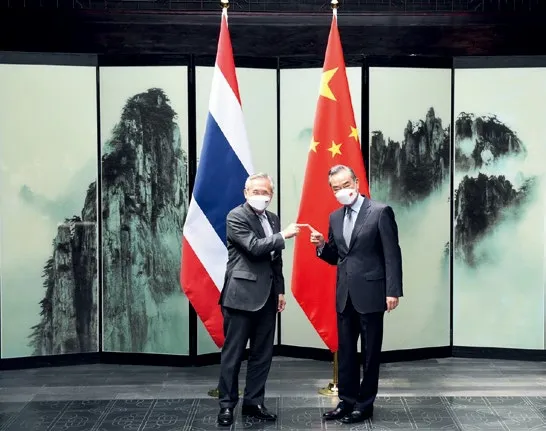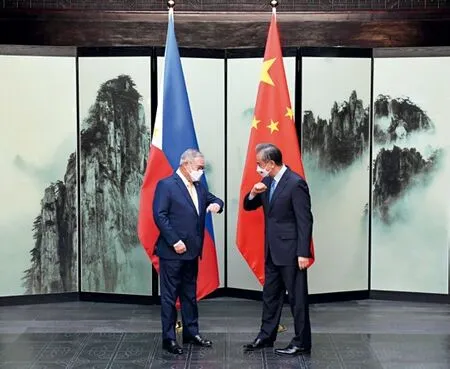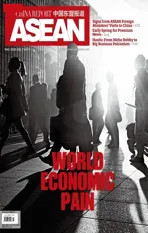Signs from ASEAN Foreign Ministers’ Visits to China
2022-06-22ByYuanYanan
By Yuan Yanan
The most recent round of talks between the Chinese foreign minister and his counterparts from four ASEAN member states will likely benefit not only the continuation of cooperation projects in different areas,but also the coordination of cross-border stances on how to cope with crisis
From March 31 to April 3,another round of diplomatic interaction took place between China and four ASEAN member states in Tunxi,a small beautiful city in southern Anhui Province.Indonesian Foreign Minister Retno Marsudi,Myanmar Foreign Minister U Wunna Maung Lwin,Thai Deputy Prime Minister and Foreign Minister Don Pramudwinai,and Philippine Foreign Minister Teodoro Locsin accepted invitations to visit China and held separate talks with Chinese State Councilor and Foreign Minister Wang Yi.
ASEAN is the priority for China’s peripheral diplomacy.The year 2022 marks the beginning of the China-ASEAN comprehensive strategic partnership.Against the backdrop of the global COVID-19 pandemic and escalating Russia-Ukraine conflict,the series of talks between the foreign ministers will not only be beneficial for the continuation of cooperation projects in different areas,but also for relevant countries to coordinate their stances on crisis response,which would be tremendously significant for accelerating world economic recovery and maintaining regional peace and stability.
Common Aspirations to Safeguard Regional Peace
During ASEAN foreign ministers’talks with their Chinese counterpart,the Russia-Ukraine conflict was a subject of common concern.Since the beginning of the conflict,the United States has worked with its Western allies to build an“anti-Russian front”by cracking down on Russia with sanctions in diplomacy,economics,public opinion,and other areas,seeking to marginalize Russia on the international stage.ASEAN countries,though far from the European battlefield,have inevitably been affected.
U.S.President Joe Biden told a press conference at NATO headquarters on March 24 that Russia should be excluded from the Group of 20 (G20).He suggested that if Indonesia,this year’s rotating chair of G20,does not agree to expel Russia,it should invite Ukraine to the group’s October summit.Despite pressure from the U.S.,Indonesia,from a neutral standpoint,invited Russian President Vladimir Putin to the summit.
In his meeting with the Indonesian Foreign Minister,Wang Yi said that China firmly supports Indonesia’s bid to host the G20 Bali Summit,stressing that the G20 should focus on macroeconomic policy coordination and should not be politicized,with all members on equal footing.He suggested no one has the right to divide the G20.
Hikmahanto Juwana,professor of international law at the University of Indonesia,said that Western countries have dragged the G20 down to become the new battleground of the U.S.-Russia conflict,taking the conflict to Indonesia.He recommended Indonesia play the role of a mediator rather than a pawn in major power competition.
On the Ukraine issue,China and Indonesia have a similar position.On March 16,Chinese President Xi Jinping had a phone conversation with Indonesian President Joko Widodo.They exchanged views on the situation in Ukraine and agreed that all parties should stay committed to promoting talks for peace and working to prevent a massive humanitarian crisis by containing the negative impact of sanctions on the world economy to preserve global economic recovery.
As the chair of this year’s APEC Economic Leaders’ Meeting,Thailand also maintained a neutral position,declaring that it would not exclude President Putin from the leaders’meeting at the end of this year.The Philippines has shown concern about getting involved in the Russia-Ukraine conflict.If the Ukraine crisis escalates into all-out war,the Philippines could be forced into the conflict due to the Philippine-U.S.military alliance.“I will not take sides with either,”said Philippine President Rodrigo Duterte.“I just don’t want to bring the war to my country.”
ASEAN countries share the common aspiration to not take sides or fall prey to becoming a pawn in major power competition.Du Lan,deputy director of the Department for Asia-Pacific Security and Cooperation at the China Institute of International Studies,thinks that because both China and ASEAN are deeply embedded in globalization,the security and stability of the strategic environment in their neighborhood is crucial to their own development.Therefore,it’s in the common interest of China and ASEAN countries to resolve conflicts peacefully on the basis of the principles of international law and to minimize negative spillover effects.

On March 31,2022,Chinese State Councilor and Foreign Minister Wang Yi (right) elbow-bumps with visiting Indonesian Foreign Minister Retno Marsudi before their talks in Tunxi,Anhui Province.

On April 1,2022,Chinese State Councilor and Foreign Minister Wang Yi (right)elbow-bumps with visiting Myanmar Foreign Minister U Wunna Maung Lwinbeforetheir talks in Tunxi,Anhui Province.

On April 2,2022,Chinese State Councilor and Foreign Minister Wang Yi (right) touches fingers with visiting Thai Deputy Prime Minister and Foreign Minister Don Pramudwinai before their talks in Tunxi,Anhui Province.

On April 3,2022,Chinese State Councilor and Foreign Minister Wang Yi (right) elbowbumps with visiting Philippine Foreign Minister Teodoro Locsin before their talks in Tunxi,Anhui Province.
In addition,the Chinese and Philippine foreign ministers exchanged views on issues regarding the South China Sea.This year marks the 20th anniversary of the signing of the Declaration on the Conduct of Parties in the South China Sea (DOC),and formulation of a Code of Conduct in the South China Sea (COC) remains the long-term goal on the agenda.Since the beginning of consultations,China and ASEAN countries have made positive progress.However,the COVID-19 pandemic has had an impact on the process.“The two foreign ministers agreed that this should not be the total of the relationship between the two Asian countries and that maritime issues should be placed in an appropriate position in bilateral relations,”reported Manila Bulletin on April 4.Locsin said that Philippines-China relations have become increasingly mature and that bilateral practical cooperation has achieved historic results,creating lasting benefits for both sides.
Joint Efforts to Accelerate Economic Recovery
Under the impact of multiple factors such as COVID-19 and the Russia-Ukraine conflict,world economic recovery in 2022 will be sluggish.
Considering the impact of the Russia-Ukraine conflict,U.S.financial services company Morgan Stanley Asia revised growth forecasts downwards for Singapore,Thailand,the Philippines and other countries in early March.The International Monetary Fund published an article stating that the Russia-Ukraine conflict had led to slower global economic growth and accelerated inflation.With both Russia and Ukraine as major commodities producers,global prices for energy,wheat,and other commodities have soared to record highs.
For China and ASEAN countries,bilateral trade has maintained growth momentum despite various adverse factors.According to statistics from China Customs,in the first two months of 2022,ASEAN briefly lagged behind the EU to drop to China’s second-largest trading partner.However,by the end of the first quarter of 2022,ASEAN had overtaken the EU to maintain its longterm status as China’s largest trading partner.
Li Kuiwen,spokesperson for the General Administration of Customs and head of its statistics and analysis department,suggested that the institutional dividend of the RCEP agreement has made China-ASEAN economic and trade cooperation closer.In the first quarter of 2022,China’s trade with ASEAN accounted for 47.2 percent of the total trade between China and its RCEP trading partners.
China and ASEAN countries are important partners in Belt and Road cooperation.In the latest round of talks,the foreign ministers agreed that all parties should increase efforts to accelerate the Belt and Road cooperation projects including the Jakarta-Bandung High-speed Railway,the China-Thailand Railway,and the China-Myanmar Economic Corridor.Wang Yi said that China is ready to work with the Philippines to advance the construction of key infrastructure projects at a faster pace to help the Philippines achieve greater results from the“Build,Build,Build”program.All parties agreed that they should seize the opportunity of implementation of the RCEP agreement to boost economic and trade cooperation,expand cooperation in electronic technology,the digital economy,new energy,interconnectivity,and other fields,maintain the stability of industrial and supply chains,and deepen cooperation on sustainable development.
“China and ASEAN are conducting negotiations on a new upgrade of the China-ASEAN Free Trade Area (CAFTA 3.0),”commented Xu Liping,researcher with the Asia-Pacific and Global Strategy Research Institute under the Chinese Academy of Social Sciences.“The RCEP will also release greater dividends of trade and investment,providing unlimited prospects for future trade and investment cooperation between China and ASEAN.Although we still face global trade protectionism and geopolitical challenges,the opportunities outweigh challenges because China and ASEAN are good neighbors,good friends and good partners.”
“Both China and ASEAN countries will support the things that benefit regional prosperity and development,”said Liu Qing,vice president of the China Institute of International Studies.The latest talks have enhanced mutual understanding and support between parties,which will inject more positive energy and stability into the world.
